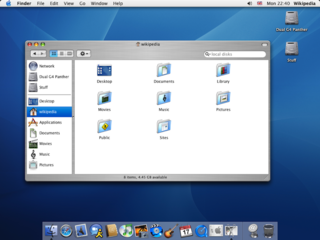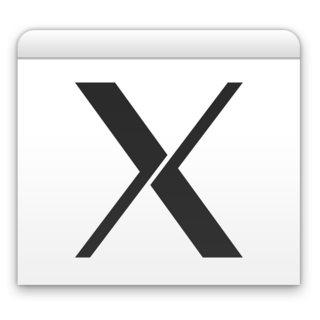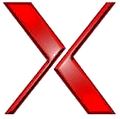XDarwin is an obsolete X Window System (X11) display server for the Darwin operating system and early versions of Mac OS X. XDarwin allows one to use programs written for X11 on those operating systems.
XDarwin was ported by the XonX project, an offshoot project created by XFree86 developers. It is integrated in the upstream source code of the XFree86 and Xorg servers, where it is maintained.
Originally, XDarwin required an X window manager to run. For this task, a window manager called OroborOSX was created; this was based on Oroborus, another X window manager, but modified to look like the native Mac OS window manager. More recent versions of XDarwin can also run in rootless mode, which is to say that it integrates with the native window manager instead of requiring such a program specifically for X.
Before the introduction of Apple's X11.app, XDarwin was the only X11 server available for OS X. According to the XonX project, X11.app itself contains code from XDarwin. Programs such as OpenOffice.org use XDarwin to run in the X11 windowing environment, either in a rootless or full-screen mode. A version of the program was created for Mac OS X Panther or higher that runs in the native Aqua interface.

The X Window System is a windowing system for bitmap displays, common on Unix-like operating systems.

Wine is a free and open-source compatibility layer that aims to allow application software and computer games developed for Microsoft Windows to run on Unix-like operating systems. Wine also provides a software library, named Winelib, against which developers can compile Windows applications to help port them to Unix-like systems.
Darwin is the core Unix operating system of macOS, iOS, watchOS, tvOS, iPadOS and bridgeOS. It previously existed as an independent open-source operating system, first released by Apple Inc. in 2000. It is composed of code derived from NeXTSTEP, BSD, Mach, and other free software projects' code, as well as code developed by Apple.
OpenStep is a defunct object-oriented application programming interface (API) specification for a legacy object-oriented operating system, with the basic goal of offering a NeXTSTEP-like environment on non-NeXTSTEP operating systems. OpenStep was principally developed by NeXT with Sun Microsystems, to allow advanced application development on Sun's operating systems, specifically Solaris. NeXT produced a version of OpenStep for its own Mach-based Unix, stylized as OPENSTEP, as well as a version for Windows NT. The software libraries that shipped with OPENSTEP are a superset of the original OpenStep specification, including many features from the original NeXTSTEP.
In computing, cross-platform software is computer software that is designed to work in several computing platforms. Some cross-platform software requires a separate build for each platform, but some can be directly run on any platform without special preparation, being written in an interpreted language or compiled to portable bytecode for which the interpreters or run-time packages are common or standard components of all supported platforms.

x86-64 is a 64-bit version of the x86 instruction set, first released in 1999. It introduced two new modes of operation, 64-bit mode and compatibility mode, along with a new 4-level paging mode.

Mac OS X Panther is the fourth major release of macOS, Apple's desktop and server operating system. It followed Mac OS X Jaguar and preceded Mac OS X Tiger. It was released on October 24, 2003, with the retail price of US$129 for a single user and US$199 for a five user, family license.

XQuartz is an open-source version of the X.Org X server, a component of the X Window System that runs on macOS. It formally replaced Apple's internal X11 app. The name "XQuartz" derives from Quartz, part of the macOS Core Graphics framework, to which XQuartz connects these applications. XQuartz allows cross-platform applications using X11 for the GUI to run on macOS, many of which are not specifically designed for macOS. This includes numerous scientific and academic software projects.
Cygwin/X is an implementation of the X Window System that runs under Microsoft Windows. It is part of the Cygwin project, and is installed using Cygwin's standard setup system. Cygwin/X is free software, licensed under the X11 License.
X.Org Server is the free and open-source implementation of the X Window System display server stewarded by the X.Org Foundation.
In software engineering, a compatibility layer is an interface that allows binaries for a legacy or foreign system to run on a host system. This translates system calls for the foreign system into native system calls for the host system. With some libraries for the foreign system, this will often be sufficient to run foreign binaries on the host system. A hardware compatibility layer consists of tools that allow hardware emulation.
Star Trek is the code name that was given to a secret prototype project, running a port of Macintosh System 7 and its applications on Intel-compatible x86 personal computers. The project, starting in February 1992, was conceived in collaboration between Apple Computer, who provided the majority of engineers, and Novell, who at the time was one of the leaders of cross-platform file-servers. The plan was that Novell would market the resulting OS as a challenge to Microsoft Windows, but the project was discontinued in 1993 and never released, although components were reused in other projects. The project was named after the Star Trek science fiction franchise with the slogan "To boldly go where no Mac has gone before".
PearPC is an architecture-independent PowerPC platform emulator capable of running many PowerPC operating systems, including pre-Intel versions of Mac OS X, Darwin and Linux. It is released under the terms of the GNU General Public License (GPL). It can be executed on Microsoft Windows, Linux, FreeBSD and other systems based on POSIX-X11. The first official release was made on May 10, 2004.
launchd is an init and operating system service management daemon created by Apple Inc. as part of macOS to replace its BSD-style init and SystemStarter. There have been efforts to port launchd to FreeBSD and derived systems.

A Hackintosh is a computer that runs Apple's Macintosh operating system macOS on computer hardware not authorized for the purpose by Apple. This can also include running Macintosh software on hardware it is not originally authorized for. "Hackintoshing" began as a result of Apple's 2005 transition to Intel processors, away from PowerPC. Since 2005, Mac computers use the same x86-64 computer architecture as many other desktop PCs, laptops, and servers, meaning that in principle, the code making up macOS systems and software can be run on alternative platforms with minimal compatibility issues. Benefits cited for "Hackintoshing" can include cost, ease of repair and piecemeal upgrade, and freedom to use customized choices of components that are not available in the branded Apple products. macOS can also be run on several non-Apple virtualization platforms, although such systems are not usually described as Hackintoshes. Hackintosh laptops are sometimes referred to as "Hackbooks".
A hybrid kernel is an operating system kernel architecture that attempts to combine aspects and benefits of microkernel and monolithic kernel architectures used in computer operating systems.
The following is a timeline of virtualization development. In computing, virtualization is the use of a computer to simulate another computer. Through virtualization, a host simulates a guest by exposing virtual hardware devices, which may be done through software or by allowing access to a physical device connected to the machine.

The Xojo programming environment and programming language is developed and commercially marketed by Xojo, Inc. of Austin, Texas for software development targeting macOS, Microsoft Windows, Linux, iOS, the Web and Raspberry Pi. Xojo uses a proprietary object-oriented language.
Comparison of user features of operating systems refers to a comparison of the general user features of major operating systems in a narrative format. It does not encompass a full exhaustive comparison or description of all technical details of all operating systems. It is a comparison of basic roles and the most prominent features. It also includes the most important features of the operating system's origins, historical development, and role.









